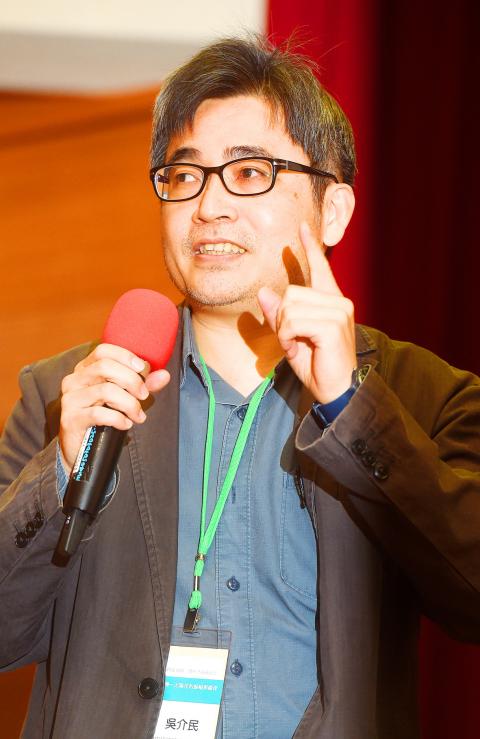Two Taiwanese academics who planned to attend an academic conference in Hong Kong on Wednesday have been denied visas to the territory.
Wu Jui-jen (吳叡人) and Wu Chieh-min (吳介民) are associate research fellows at Academia Sinica’s Institute of Taiwan History and Institute of Sociology respectively, and had been invited by the Hong Kong Federation of Students (HKFS) to attend an academic conference discussing the colonization of Hong Kong from the period of British rule to the age of being a special administrative region from different academic angles, a statement on HKFS’ Facebook page said.
Fu Jen Catholic University law professor Wu Hao-jen (吳豪人) was also invited to the conference and had been granted a visa, but has decided not to attend in protest of the Hong Kong government’s unreasonable denial of the other two academics’ entry, HKFS wrote in the statement.

Photo: Chien Jung-fong, Taipei Times
This shows that China more intricately understands the connections and exchanges between Taiwan and Hong Kong, and that China’s control over the territory is increasingly strict, Wu Jui-jen said.
After the “Umbrella movement,” Hong Kong’s younger generation attempted to regroup and hopes to be able to reorganize the localization movement and pro-independence ideas to establish a new discourse, Wu Jui-jen said.
This might have made the Chinese Communist Party (CCP) nervous, leading the party to suppress and block academic exchanges between Taiwan and Hong Kong to “prevent Taiwan from continuing to pollute Hong Kong,” Wu Jui-jen said.
China’s control over Hong Kong has expanded from public exchanges between social movement figures to private academic events, Wu Jui-jen said, adding that he and others no longer have an “optimistic illusion” about the situation in Hong Kong.
When interactions between Taiwan and Hong Kong turn from two-way to one-way exchanges, Taiwan must reconsider its own position, Wu Jui-jen said.
A large-scale partnership between Taiwan and Hong Kong is increasingly unlikely, Wu Jui-jen said.
As an important nation that represents democracy in the East Asian region, Taiwan should develop a new partnership model with Hong Kong, Wu Jui-jen added.
This is the CCP blocking contact between Taiwan and Hong Kong from all directions, National Cheng Kung University political science professor Leung Man-to (梁文韜), who is from Hong Kong, said in an interview.
Anyone who supports Hong Kong’s protest movements might be added to the CCP’s blacklist, Leung said.
Taiwan Thinktank researcher Tung Li-wen (董立文) said that China’s control over Hong Kong has become increasingly strict.
Under this oppression, Taiwan could possibly become the next overseas base for Hong Kong’s protest movements, Tung added.
In July, National Taiwan University sociology professor Ivan Ho (何明修) faced difficulty trying to attend an academic conference in Hong Kong and was only able to receive a visa after a series of complications.
In the past, it was “understandable” that participants of the Sunflower movement could not enter Hong Kong, Ho said in an interview.
However, Beijing is making it difficult for people to attend academic conferences, Ho said, adding that he believes that the Chinese government’s surveillance network might have been expanded.
General Association of Chinese Culture deputy secretary-general Chang Tieh-chih (張鐵志) was also denied entry to Hong Kong earlier this month.

The CIA has a message for Chinese government officials worried about their place in Chinese President Xi Jinping’s (習近平) government: Come work with us. The agency released two Mandarin-language videos on social media on Thursday inviting disgruntled officials to contact the CIA. The recruitment videos posted on YouTube and X racked up more than 5 million views combined in their first day. The outreach comes as CIA Director John Ratcliffe has vowed to boost the agency’s use of intelligence from human sources and its focus on China, which has recently targeted US officials with its own espionage operations. The videos are “aimed at

STEADFAST FRIEND: The bills encourage increased Taiwan-US engagement and address China’s distortion of UN Resolution 2758 to isolate Taiwan internationally The Presidential Office yesterday thanked the US House of Representatives for unanimously passing two Taiwan-related bills highlighting its solid support for Taiwan’s democracy and global participation, and for deepening bilateral relations. One of the bills, the Taiwan Assurance Implementation Act, requires the US Department of State to periodically review its guidelines for engagement with Taiwan, and report to the US Congress on the guidelines and plans to lift self-imposed limitations on US-Taiwan engagement. The other bill is the Taiwan International Solidarity Act, which clarifies that UN Resolution 2758 does not address the issue of the representation of Taiwan or its people in

US Indo-Pacific Commander Admiral Samuel Paparo on Friday expressed concern over the rate at which China is diversifying its military exercises, the Financial Times (FT) reported on Saturday. “The rates of change on the depth and breadth of their exercises is the one non-linear effect that I’ve seen in the last year that wakes me up at night or keeps me up at night,” Paparo was quoted by FT as saying while attending the annual Sedona Forum at the McCain Institute in Arizona. Paparo also expressed concern over the speed with which China was expanding its military. While the US

DEFENDING DEMOCRACY: Taiwan shares the same values as those that fought in WWII, and nations must unite to halt the expansion of a new authoritarian bloc, Lai said The government yesterday held a commemoration ceremony for Victory in Europe (V-E) Day, joining the rest of the world for the first time to mark the anniversary of the end of World War II in Europe. Taiwan honoring V-E Day signifies “our growing connections with the international community,” President William Lai (賴清德) said at a reception in Taipei on the 80th anniversary of V-E Day. One of the major lessons of World War II is that “authoritarianism and aggression lead only to slaughter, tragedy and greater inequality,” Lai said. Even more importantly, the war also taught people that “those who cherish peace cannot